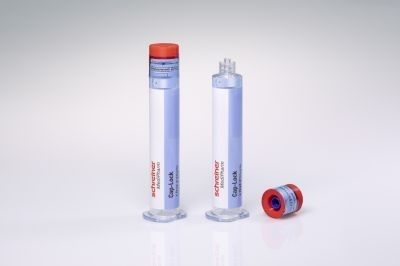Driving digitization forward in hospitals requires product solutions based on RFID technology. To support this trend Schreiner MediPharm has equipped its tamper-evident specialty label ‘Cap-Lock’ with an RFID inlay. The security concept, for prefilled syringes, consisting of a label and cap adapter, now additionally enables automated inventory and supply chain management as well as digital first-opening indication. This offers efficient and reliable product authentication and enhances patient safety, says the company.
Equipping syringes containing liquid medications with RFID-Labels posed a challenge, as both the container material and the composition of the liquid may impair reading of a UHF RFID-Label. Flag labels protruding from the container are frequently used for this purpose. However, they can easily tear off, require additional space and have to be manually applied, according to Schreiner.
With Cap-Lock plus RFID, the RFID chip is integrated in the label, being a combination of a cap adapter and label. The adapter is placed on top of the syringe’s primary closure and interlinked with it to equalize the diameter differences of the syringe body and closure. The label wraps around the syringe body and cap adapter and—once opened—provides irreversible tamper evidence due to an integrated perforation.
The RFID inlay is located in the upper part of the label at the level of the cap, so largely sits outside the liquid-filled area and enables reliable long-range reading, claims the company. Due to the RFID functionality, digital first-opening evidence is now possible in addition to the previous, purely visual first-opening indication provided by the destroyed label. The RFID-Label can be automatically processed as part of the primary container’s normal labelling workflow, it says.
For live monitoring and control of the logistic flow of materials and products in automated inventory and supply chain management, the data of syringes equipped with RFID-Labels can be automatically captured at various stations. As a result of reading the picked and placed products, current inventory information is stored in a database. Additionally, integrity, first-opening or tampering with containers can be digitally monitored.
In medication management, the data—such as product name, manufacturer, batch number and expiration date -stored on the RFID-Labels – are read automatically either individually or in bulk using simple handheld or specialty readers and matched with a data base. This enables exact tracking of inventories and provides transparency about medicines that are missing or approaching their expiration date.
Source : AIPIA Newsroom
Packaging 360 is a comprehensive knowledge sharing ecosystem for the Indian packaging industry. Our services include an online content platform to deliver news, insights and case studies; organising conferences seminars and customised training; Providing Bespoke Project Consulting, Market Research and Intelligence.







